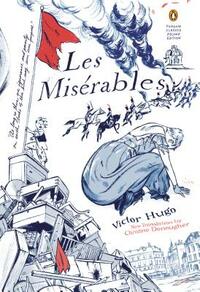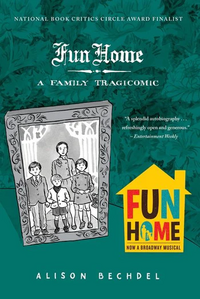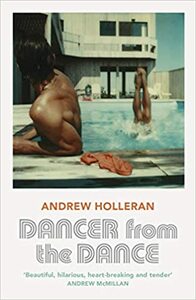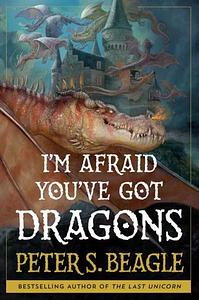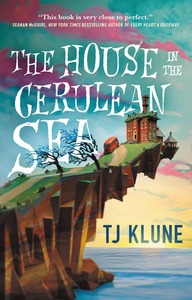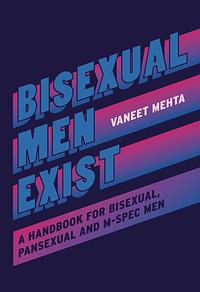You need to sign in or sign up before continuing.
Take a photo of a barcode or cover
davidaguilarrodriguez's Reviews (186)
adventurous
emotional
funny
hopeful
informative
inspiring
reflective
slow-paced
Plot or Character Driven:
A mix
Strong character development:
Yes
Loveable characters:
Yes
Diverse cast of characters:
Complicated
Flaws of characters a main focus:
Complicated
I’m going to need time to write this review. In the meantime, the following quip by Jean Cocteau has never made more sense:
Victor Hugo was a madman who thought he was Victor Hugo!
Victor Hugo was a madman who thought he was Victor Hugo!
dark
emotional
funny
hopeful
reflective
sad
medium-paced
Where to start with Fun Home? It felt like someone had cracked open the architecture of my own life in a lot of ways. As a writer, as someone with a broken (nonexistent) relationship with my father, and as someone whose understanding of their family has been filtered through books, movies, art, and theory - this just hit different.
Even though the book relies heavily on references to Ulysses, the work itself is Bechdel’s A Portrait of the Artist. It’s actually a great coming-of-age story (and my favorite kind: the Künstlerroman!).
Even though the book relies heavily on references to Ulysses, the work itself is Bechdel’s A Portrait of the Artist. It’s actually a great coming-of-age story (and my favorite kind: the Künstlerroman!).
That’s not to say it wasn’t at times a bumpy read. It’s not a book I could just sit down and plow through. I had to stop. Collect myself. Consider putting it down and not continuing. But it kept drawing me back — not because it was easy, but because it was true. Emotionally, intellectually, artistically true.
Bechdel reconstructs her life out of myth, modernism, and memory. It’s Joyce and Wilde and Proust filtered through funeral homes, family trips, and broken communication. The intertextuality makes the book layered, self-aware, rich with irony and meaning. One review I read online criticized the book for having too many references to things... um, that's kind of the entire point of the style, form, and story???? Executed brilliantly. And if you want to deepen your reading of it, you're in luck because the book itself provides you with the required reading list!
This is a memoir about trying to decode a closeted father’s life through books — while discovering your own identity through the same. It’s about queerness, repression, inheritance, and the ways we use art to name the things our families won’t say out loud. It’s emotionally devastating. It’s brilliant. It’s one of the best books I’ve ever read.
emotional
reflective
sad
medium-paced
Plot or Character Driven:
Character
Strong character development:
Yes
Loveable characters:
Yes
Diverse cast of characters:
Yes
Flaws of characters a main focus:
Yes
This book is like if The Great Gatsby had a lot more Central Park blowjobs, bathhouse orgies, Quaaludes, and fisting. Which come to think of it, I’m not sure that it didn’t...
The Gatsby parallels aren’t just surface-level, though. They’re built into the DNA of the novel: the doomed beauty, the longing for connection, the sense of something irrevocably lost beneath the glitter and lights. But here, the party is gay New York in the 1970s — a world where transcendence is sought not in wealth or status but in bodies, ecstasy, and the fleeting promise that someone, anyone, might hold you through the night.
The Gatsby parallels aren’t just surface-level, though. They’re built into the DNA of the novel: the doomed beauty, the longing for connection, the sense of something irrevocably lost beneath the glitter and lights. But here, the party is gay New York in the 1970s — a world where transcendence is sought not in wealth or status but in bodies, ecstasy, and the fleeting promise that someone, anyone, might hold you through the night.
Malone, the book's tragic beauty and Jay Gatsby parallel, is unforgettable. He's magnetic, haunted, searching — but not quite broken. Sutherland, the Puck-like guide through this neon underworld, is both grotesque and fabulous, emanating light while pulling us into the shadows. The narrator floats somewhere between voyeur and ghost. He was less defined than Nick Carraway, but frankly, Malone is a superior Gatsby, so it balanced out.
The novel’s heart — and the moment that hit me hardest — is the interlude detailing Malone’s backstory. His coming of age. His lonely Sunday nights, aching for family, longing to be "normal," yearning for something that wasn’t on offer to gay men at the time. That whole sequence is a quiet, devastating masterpiece.
Dancer from the Dance is about the search for transcendence — but not abstract transcendence. It’s the search for love, a grounding and grounded love, a strong foundation to build a future on. Malone couldn’t find any of that simply because of when he lived. That's the tragedy of gay Americans in that time. The nightlife, the sex, the drugs — they weren’t freedom. They were a half-life. They were survival. And they were better than nothing… for a while at least.
It’s one of the most beautiful novels I’ve ever read. Instant classic. I’ll be thinking about it for a long time.
lighthearted
fast-paced
Plot or Character Driven:
A mix
Strong character development:
No
Loveable characters:
Yes
Diverse cast of characters:
No
Flaws of characters a main focus:
No
Cute, light entertainment. Nothing groundbreaking, but mostly enjoyable and pleasant.
The writing has a gentle whimsy to it, though I kept wanting it to be funnier. It’s more mildly amusing than laugh-out-loud. If the comedy had been a little more foregrounded, I think it would have really clicked. Still, the characters are likable. I especially liked Reginald, the handsome, buffoonish, good-hearted prince charming.
Even though this felt slight, I enjoyed it enough to be interested in reading something else by Beagle that people seem to love more. I’ve heard The Last Unicorn is very good.
If you’re looking for something breezy and low-stakes, this does the trick.
challenging
dark
emotional
hopeful
reflective
sad
medium-paced
Plot or Character Driven:
Character
Strong character development:
Yes
Loveable characters:
Yes
Diverse cast of characters:
Complicated
Flaws of characters a main focus:
Complicated
This one hit me dead on.
A restrained, quietly eerie novel that builds slowly and lands with devastating emotional and philosophical force. It’s about clones , yes — but more than that, it’s about humanity, inhumanity, memory, fate, and how we treat other sentient beings who feel pain, pleasure, connection, and longing.
Normally, muted prose is not my thing, but here the restraint really works. It lulls you into contemplation without sacrificing stakes in the story. The emotional ambiguity, the fog of memory, the polite avoidance of true horror, the aching but unsentimental voice of the narrator… all of it is masterful.
Kathy, Tommy, and Ruth are beautifully rendered characters — messy, contradictory, resigned — and their complicated relationship is the anchor that keeps the story grounded in an emotional truth. The most brilliant thing this book does is root enormous ethical questions inside a small, sad, deeply human love triangle.
Kathy, Tommy, and Ruth are beautifully rendered characters — messy, contradictory, resigned — and their complicated relationship is the anchor that keeps the story grounded in an emotional truth. The most brilliant thing this book does is root enormous ethical questions inside a small, sad, deeply human love triangle.
As I read, I kept thinking not just about cloning , but about animals. Specifically, about how we already treat beings with minds and hearts and memories — as resources, as background noise, as experiments, as food, as organs to plunder. This is a novel about consciousness, moral complicity, and what we choose not to see. It forces you to ask: what do we owe to the other thinking and feeling beings in our world?
The genius of Never Let Me Go is that it never screams. It doesn’t preach, or shock, or moralize. It just lays out a perfectly constructed, emotionally precise story and lets the powerful existential questions bloom in the background. It’s subtle. And it lingers.
I think this one will stay with me for a long time.
informative
inspiring
Good intro to thinking about these issues. A reminder to me to stay committed to the cause and keep fighting — I don’t want to look back and see that I was on the wrong side of history.
emotional
inspiring
mysterious
fast-paced
Plot or Character Driven:
Character
Strong character development:
Yes
Loveable characters:
Yes
Diverse cast of characters:
No
Flaws of characters a main focus:
No
A short, strange, surprisingly sweet little story from Stephen King — not horror, not heart-stopping, just quietly emotional and vaguely existential. I liked it.
The opening hooked me right away: the world is ending, no one knows why, and mysterious billboards start appearing with this guy Chuck all over them. It’s just ambiguous enough to pull you in. The structure unfolds in reverse, which felt... fine. It wasn’t necessary, but it didn’t hurt. Mostly it read like a series of emotional vignettes stitched together to build a mood.
Chuck himself feels more like a symbol than a character — a placeholder for Big Life Stuff: joy, regret, love, time, memory. And that’s fine, because this isn’t really a character study. It’s more of an allegory about what makes life meaningful, and how small, beautiful moments add up to something bigger.
There are some genuinely lovely scenes: Chuck dancing with buskers in the street; a flashback to a high school dance; a subplot involving another man reconnecting with his ex-wife even as the world unravels. It all adds up to a tone that blends speculative mystery with a sort of earnest, almost corny optimism — but it's subdued and mostly works.
This wasn't earth-shattering, but it’s a nice reminder that even amidst chaos, there’s beauty, connection, and weird little grace notes that stick with you. I’m looking forward to seeing the movie.
funny
lighthearted
fast-paced
Plot or Character Driven:
Character
Strong character development:
Yes
Loveable characters:
Yes
Diverse cast of characters:
Yes
Flaws of characters a main focus:
Yes
UPDATE: Found out about the controversy of this book and the inspiration for the school. Yikes. Downgraded by a point. Original review below:
This was almost a charming, cozy little read. Almost.
This was almost a charming, cozy little read. Almost.
The setup is lovely: an uptight caseworker visits a seaside orphanage for magical children and, in true storybook fashion, slowly learns to open his heart. It walks a fine line between quirky and cloying — and while it often lands on the right side of that line, it also occasionally tips into the treacly, twee, and overly cutesy.
The found family dynamics are fun, and the supporting cast (especially Lucy, the Antichrist child with a heart of gold) brings much-needed humor. The gay romance is a welcome touch too, though to be honest I kind of hated Arthur (the love interest and schoolmaster) for being a little too know-it-all-perfect.
But here’s the thing that really took me out of the experience: the fatphobia. The main character is repeatedly described as “rotund,” having a “spare tire,” and lumbering around like a joke — even though his insecurity, ineptitude, and awkwardness are already well established in other ways. The entire book is about accepting people for who they are — magical differences, sexual or gender identities, histories, personalities — and yet the author uses weight as a shorthand for inadequacy. It’s that lazy, reflexive fat-shaming that shows up everywhere in pop culture, and it feels especially disappointing in a story that wants so badly to be warm and welcoming.
I get that internalized fat-phobia is a thing, and you might say "but that's the point, the other characters accept him for who he is but he needs to learn to love himself." Except that catharsis doesn't really come, and he's only fine with his weight because his love interest accepts him... but he still doesn't like that he has a "spare tire" in the end, he just stops focusing on this alleged deficiency.
I get that internalized fat-phobia is a thing, and you might say "but that's the point, the other characters accept him for who he is but he needs to learn to love himself." Except that catharsis doesn't really come, and he's only fine with his weight because his love interest accepts him... but he still doesn't like that he has a "spare tire" in the end, he just stops focusing on this alleged deficiency.
Without that, I probably would’ve landed at a soft 3 — a light, sweet, overly precious book that mostly gets by on good intentions and low-stakes. But the body-shaming grated on me enough to drop the score. It undercut the comfort read I was hoping for and turned what could have been a breezy experience into something that left a sour taste.
Moderate: Fatphobia
informative
medium-paced
Summary: we do!
challenging
dark
emotional
funny
mysterious
reflective
slow-paced
Plot or Character Driven:
Character
Strong character development:
Yes
Loveable characters:
Complicated
Diverse cast of characters:
Yes
Flaws of characters a main focus:
Yes
Finished Juneteenth on Juneteenth. Coincidence? I think not.
Fascinating, absolutely one of a kind. Ralph Ellison was on a whole other level. Absolutely nobody could write like him or see the world the way he did. Virtuosic passages, funny, crazy, dark, scary even.
That said, it’s clear this was an unfinished work, and it’s missing the narrative cohesion that Invisible Man had. Glad his estate released the material, but wish he had been able to finish it!
Fascinating, absolutely one of a kind. Ralph Ellison was on a whole other level. Absolutely nobody could write like him or see the world the way he did. Virtuosic passages, funny, crazy, dark, scary even.
That said, it’s clear this was an unfinished work, and it’s missing the narrative cohesion that Invisible Man had. Glad his estate released the material, but wish he had been able to finish it!
